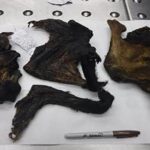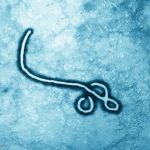A consumer advisory for bushmeat has been issued by the Minnesota Department of Agriculture (MDA). This illegal product was confiscated in December 2021 at the Minneapolis-St. Paul International Airport. There have been "multiple instances" of bushmeat being smuggled into Minnesota from Liberia, according to the notice. Those products were seized and destroyed. Bushmeat is raw or minimally processed meat that comes from wild animals, usually monkeys and other nonhuman primates, cane rats (grasscutters), duiker antelope, and bats. These products carry a risk of human infection from different pathogens, including the Ebola virus. Ebola is spread through direct contact with the blood or body fluids of a person who is sick with the virus or who has died from it. The virus is usually … [Read more...]
Farming and Deforestation Could be Behind Ebola Outbreak
According to an article in The Conversation, deforestation and industrial-scale farming could have been a contributing factor in the Ebola outbreak in Africa. The global palm oil industry has been deep-cutting into forests; this helps spread pathogens by opening areas formerly untouched to human exploration. And land grabs force animals out of forests where they come into more frequent contact with humans. The Ebola virus occurs in fruit bats, which are natural hosts. When people in very poor communities face scarcity of food, they go further into the forest to hunt and butcher wildlife, known as bush meat. Bush meat is a major source of the virus. These changes lead to something called an Allee effect, which occurs when changes in one part of the ecology cause populations in … [Read more...]
On World Food Day, U.N. Warns of Ebola Food Crisis
Today is World Food Day. The U.N. said that the Ebola crisis in Africa is causing a food crisis. The U.N.'s World Food Program (WFP) needs to reach 1.3 million people in need of food in Liberia, Sierra Leone, and Guinea, the hardest-hit regions in the outbreak. That agency has supplied more than half a million people in those areas with food. Denise Brown, WFP's Regional Director for West Africa said in a statement, "the world is mobilizing and we need to reach the smallest villages in the most remote locations. Indications are that things will only get worse before they improve. How much worse depends on us all." Border closures, market closures, and restricted travel threaten food access to many in the region. The WFP provides food to patients at Ebola treatment facilities and to … [Read more...]
Ebola Outbreak Started Through Contact with Fruit Bats
The current Ebola outbreak crisis that has many people so worried started in eastern Guinea, through a "chance contact" by a toddler with an infected fruit bat. Fruit bats are natural reservoirs for the virus, according to the World Health Organization. The bats migrate over long distances. Fruit bats are regularly eaten in rural West Africa. Direct transmission to people is very rare. Many people in very poor countries hunt the bats for food, and also hunt bushmeat, with people eating dead infected animals. There has also been huge death rates in chimpanzee and gorillas in African countries. Those animals eat fruit dropped to the ground by infected bats. People forage in the forests where these sick and dying animals live, and come into direct contact with "blood, secretions, organs, … [Read more...]
Global Health Security Agenda Addresses Animal Disease Link
The White House released a fact sheet on Friday about the Global Health Security Agenda (GHSA). Discussions were held at the White House which included leaders of the World Health Organization (WHO), the World Organization for Animal Health, and representatives from 40 countries. FAO Director-General Jose Graziano de Silva spoke about the need for animal health controls to stop the spread of disease from animals to humans. The Ebola outbreak highlights this need. He said that "controlling zoonotic diseases and emerging threats at the human, animal and ecosystems interface needs an integrated and multidisciplinary approach that brings different sectors to work closely together to attain the health of people, animals, and the environment." He added "there is a need to set up global … [Read more...]
U.N. Says Ebola Crisis Could Become Food Insecurity Crisis
The Ebola outbreak in Guinea, Liberia, Sierra Leone and other West African countries has made food expensive and hard to find. Labor shortages because of the outbreak are putting the harvest season at risk and trade is being disrupted, according to the Food and Agriculture Organization (FAO) of the United Nations. This has led to "panic buying" and food shortages. The harvest season in West Africa begins in September. There were positive crop production outlooks at the start of the season. Unfortunately, the areas with high incidences of the Ebola virus are among the most agriculturally productive areas of Liberia and Sierra Leone. The organization has issued a special alert on this situation. Bukar Tijana, FAO Regional Representative for Africa said in a statement, "Access to food … [Read more...]
WHO Updates Ebola Advice About Transmission Through Food
The World Health Organization has released information about Ebola transmission and food safety. An outbreak of Ebola is ongoing in several African countries. The infection is only transmitted through direct contact with blood, bodily fluids, and tissues of infected people or animals. The Ebola virus can sicken non-human primates, bats, small rodents, and shrews. The initial source of past Ebola outbreaks was human contact with wild animals through hunting, butchering, and preparing meat from infected wild animals. Most of the cases in the current outbreak, however, are through human to human contact. If foods are properly prepared and thoroughly cooked, people cannot get sick by eating them. The virus is killed by cooking temperatures. Basic hygiene measures can prevent infection, … [Read more...]









